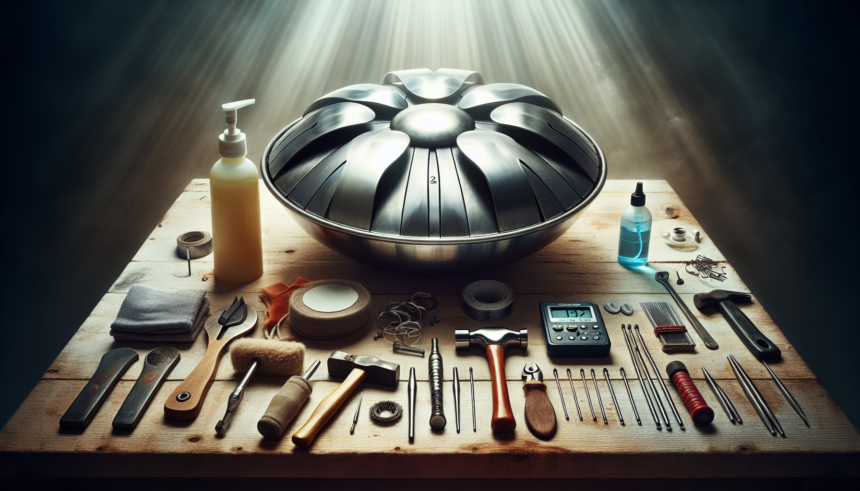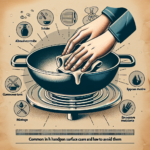<!DOCTYPE html>
<html lang="en">
<head>
<meta charset="UTF-8">
<meta name="viewport" content="width=device-width, initial-scale=1.0">
<title>Handpan Maintenance Article</title>
</head>
<body>
<article>
<p>Handpans are beautiful and unique musical instruments that resonate with soothing, complex tones, offering a mesmerizing auditory experience. Originating from the family of steelpan instruments, the handpan has become popular in diverse musical cultures worldwide. However, its delicate nature necessitates proper care to maintain its melodious charm. Proper maintenance not only enhances the instrument's longevity but also ensures its pitch remains perfect. This article navigates through essential tools and practices necessary to keep your handpan in prime condition.</p>
<h2>Understanding the Importance of Regular Maintenance</h2>
<p>The handpan, known for its intricate soundscapes, is sensitive to external conditions such as humidity, temperature changes, and physical damage. Regular maintenance helps preserve its delicate structure and tuning stability. A well-maintained handpan retains its alluring sound quality, offering musicians the true essence of its harmonious capabilities.</p>
<p>The body of a handpan is typically made of nitrided steel or stainless steel, both of which can be susceptible to rust and wear over time if not cared for properly. Furthermore, the thin, steel membrane known as the 'dome' which creates its distinctive notes, can be thrown out of tune due to mishandling or exposure to harsh conditions.</p>
<h2>Essential Tools for Handpan Maintenance</h2>
<p>To maintain your handpan, a few essential tools and practices are vital. These tools help in cleaning, tuning, and preserving the structural integrity of the instrument:</p>
<h3>1. Microfiber Cloth</h3>
<p>A high-quality microfiber cloth is essential for regular cleaning. Dust and smudges collect over time, affecting the handpan's appearance and, potentially, sound quality. A gentle wipe with a microfiber cloth, ideally after each session, helps maintain its polish and cleanses it from oils accumulated from your hands.</p>
<h3>2. Protective Oil</h3>
<p>Application of protective oil plays a critical role in handpan maintenance. These oils create a moisture barrier, preventing rust formation, which can deteriorate musical quality. Applying oil like Phoenix oil or FrogLube regularly ensures that your instrument stays well-protected from harsh environmental elements.</p>
<h3>3. Soft Carry Case or Protective Hard Case</h3>
<p>Transporting a handpan requires careful consideration to avoid any accidental impacts. Investing in a quality soft carry case or a robust hard case provides essential protection during transport, ensuring your handpan is safe from potential dents or scratches.</p>
<h3>4. Desiccant Packets</h3>
<p>Humidity is a silent adversary for handpans, especially in varying climatic conditions. Desiccant packets in your handpan case can absorb excess moisture, shielding the instrument from rust and tuning problems. Replace these packets regularly to ensure they are effective.</p>
<h3>5. Tuning Tools</h3>
<p>While tuning a handpan should ideally be left to professionals, having basic tuning knowledge and tools like a tuner can be handy. If you feel that the notes are slightly off, a tuner can help you verify and decide if professional tuning is necessary.</p>
<h2>Routine Practices for Handpan Maintenance</h2>
<p>Alongside these tools, implementing routine practices further enhances the life and pitch of your handpan. Here are some recommended practices:</p>
<h3>Regular Cleaning</h3>
<p>In conjunction with using a microfiber cloth, regular cleaning involves gently wiping the handpan's surface after each play to remove sweat and oils. Periodically, after oiling, a slightly damp cloth can be used for deeper cleaning.</p>
<h3>Avoiding Direct Sunlight and Extreme Temperatures</h3>
<p>Extreme temperatures and direct sunlight can have deleterious effects on your handpan. Prolonged exposure to these conditions affects metal fatigue and tuning integrity. Always store your instrument away from sunlit areas and retain it in a climate-controlled environment when possible.</p>
<h3>Correct Handling and Storage</h3>
<p>Handle your handpan with care. Avoid placing it directly on the ground or any harsh surfaces where it might acquire dents or scratches. When not in use, store it in its protective case in an upright position to mitigate risks of accidental damage.</p>
<h3>Professional Servicing</h3>
<p>Handpans may require professional re-tuning services over time to restore its perfect pitch. These experts delicately adjust the instrument, ensuring every note is in perfect harmony. Servicing frequency depends on usage and environmental factors, typically ranging from annually to every few years.</p>
<h2>Understanding Signs of Distress</h2>
<p>Recognizing signs that your handpan requires attention is crucial. Listen for changes in pitch, observe any discoloration suggesting rust, and feel for texture changes indicating potential wear. Addressing these signs early through maintenance or professional servicing ensures that the handpan continues to deliver its captivating tones.</p>
<h2>Conclusion</h2>
<p>Maintaining a handpan is a blend of passion and practicality. By integrating these tools and practices into routine care, owners can safeguard the instrument’s enchanting sound and enhance its longevity. As you nurture your handpan through its musical journey, the cosmic harmonies produced become a reward in itself, reflecting dedication to maintaining its pitch-perfect allure.</p>
<h2>FAQs</h2>
<h3>1. How often should I apply oil to my handpan?</h3>
<p>It's advisable to oil your handpan about once a month, depending on your climate and how frequently you play. In more humid conditions, you may need to apply it more often to prevent rust.</p>
<h3>2. Can I tune my handpan myself?</h3>
<p>Tuning a handpan is a delicate process typically best handled by professionals. Attempting it without expert knowledge can risk further detuning or damage.</p>
<h3>3. How can I prevent rust on my handpan?</h3>
<p>Prevent rust by regularly cleaning your handpan, applying protective oil, using desiccant packets in storage cases, and avoiding exposure to moisture or humid environments.</p>
<h3>4. Should I always store my handpan in a case?</h3>
<p>While storing in a case isn't always necessary when playing frequently at home, it is essential for transport and safe storage long-term to protect from dust, moisture, and impacts.</p>
<h3>5. What should I do if my handpan gets wet?</h3>
<p>If your handpan gets wet, immediately dry it thoroughly with a microfiber cloth and ensure no water remains on the surface. Apply protective oil once dry to prevent rust.</p>
</article>
</body>
</html>Handpan Maintenance: Tools to Keep Your Instrument Pitch-Perfect

Leave a comment




